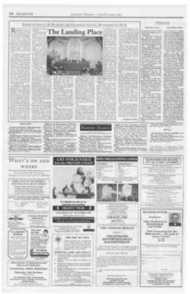Page 3, 17th October 1997
Page 3

Report an error
Noticed an error on this page?If you've noticed an error in this article please click here to report it.
Tags
Share
Related articles
Raf Hero Honoured
Hungarian Hero To Stay In Britain
My Neighbour, The Catholic War Hero
In Brief
How We Betrayed Our Heroes
Battle of Britain hero honoured
Squadron Leader Robin McNair, who died last year, is to have a street named after him in west London. Andrew M Brown chronicles a remarkable life
A CATHOLIC HERO of the Battle of Britain who refused to bomb a church and had Masses said for pilots he shot down is to be honoured by having a road named after him in Southall, west London.
Squadron Leader Robin McNair, who died last year, combined in his personality brilliance and courage as a pilot with a modest and contemplative religious nature.
Ealing Council in West London have decided to name the largest new road in a housing estate after the pilot. Other heroes of aviation will be similarly honoured, including the inventor of the jet engine, Sir Frank Whittle.
Duncan, his youngest son, told the Catholic Herald that the family were moved by the honour. "He was a man of great modesty," said Duncan McNair. "We are very moved that his life should be remembered in this way."
Dom Bernard Orchard, the distinguished scholar of Ealing Abbey and a friend of Mr McNair's, said he "knew of no one more deserving of being honoured by his coun try for his integrity and citizenship".
In a tribute organised when Mr McNair was nominated for the 1990 New Year's Honours list, Bishop Cormac Murphy O'Connor of Arundel and Brighton said: "His life and career exemplified what was best in English and Catholic tradition".
Mr McNair joined the RAF in 1939, by which time the 21-year-old, who was born in Rio de Janeiro and educated at Douai, was already a first class cricketer and had played scrum-half for Sussex.
He made almost 300 sorties during the Second World War, including, as acting wing commander, the devastating raid by 124 Wing, in Hawker Typhoons, on the retreating German Seventh Army at the Falaise gap in Normandy in 1944, which left Rommel disabled. Mr McNair was decorated DFC with Bar by George VI.
He had a great devotion to Our Lady, and at the outset of hostilities pledged to his wife Estelle that, should he return, they would make a pilgrimage to Lourdes. And he was proud of his Page family ancestors, many of whom were murdered for their faith during the reformation.
While always remembering one of his favourite slogans — "toujours la politesse" — he would write rip-roaring letters to Cardinal Hume bemoaning what he called the "enfeebled state" of the Catholic hierarchy. He was devoted to his work for the poor, for pro-life charities and for the SVP.
"Mac" McNair, whose heroes were St Paul, St Augustine and St Thomas More, was not, however, an unthinking follower of orders. When his commanding officer instructed him to blow up a French village church, he refused, saying he could not destroy a church unless it could be proven that it was harbouring the enemy.
None of Mr McNair's seven children was able to follow him into the RAF. All his sons are colour blind.
blog comments powered by Disqus













